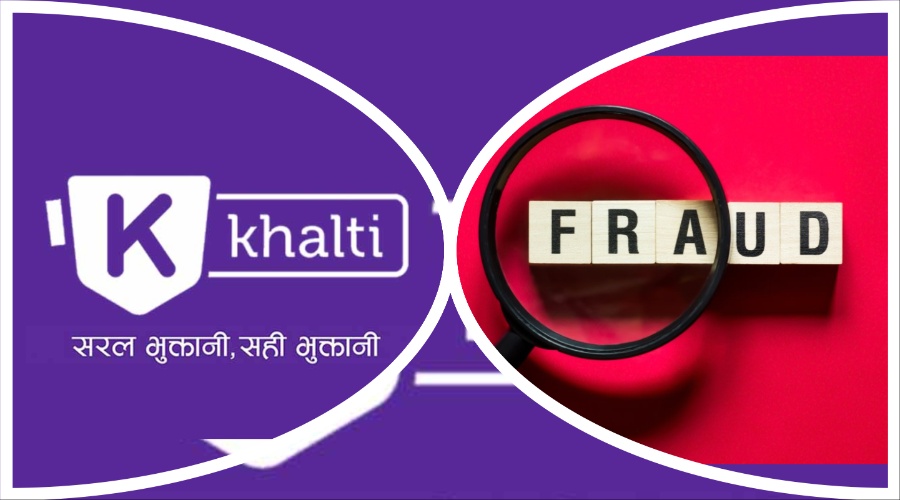Trust in Tatters: Khalti Wallet’s scandal exposes alarming breach of customer security

KATHMANDU: Khalti Digital Wallet, one of Nepal’s leading fintech platforms, has come under fire after revelations of employee misconduct involving the misuse of customer information for fraudulent activities. While digital wallets have been lauded as a cornerstone of Nepal’s move toward a cashless economy, this incident has sparked widespread concern about the safety and integrity of customer data.
With over a million users, Khalti’s failure to safeguard personal information has not only jeopardized consumer trust but also raised serious questions about the platform’s credibility and security measures.
A Breach of Trust
The Kathmandu Valley Crime Investigation Office’s findings are deeply troubling: Khalti employees misused customer-provided Know Your Customer (KYC) documents to create over 55 illegal wallets, aiding criminal syndicates in fraudulent financial transactions. Personal details such as photographs and citizenship copies, entrusted to Khalti for verification, were downloaded and exploited for these activities.
For consumers, this breach feels like a betrayal. The very platform that marketed itself as a secure and convenient alternative to traditional banking systems has failed to fulfill its promise. How can users trust a company that cannot guarantee the basic protection of their sensitive information?
Consumer Voices: Anger and Betrayal
The public reaction has been swift and unforgiving. Social media platforms are flooded with angry posts and demands for accountability. “I trusted Khalti with my personal information, and now I feel unsafe even using their app,” said one user on Twitter. Another commented, “If Khalti can’t secure something as basic as my citizenship document, why should I risk my money with them?”
These sentiments reflect the widespread anxiety among Khalti users. The digital economy thrives on trust, and once that trust is broken, rebuilding it is an uphill battle.
The Bigger Picture: A Systemic Issue
This incident is not just about Khalti; it highlights a broader issue within Nepal’s rapidly growing fintech industry. With minimal regulation and oversight, many digital platforms operate without stringent data protection policies. The lack of consumer protection mechanisms exacerbates the problem, leaving users vulnerable to fraud.
Khalti’s failure to prevent such a blatant misuse of customer data exposes gaps in its internal controls. The company’s reliance on employees for manual verification processes, combined with inadequate monitoring systems, allowed the scam to flourish.
“This is a wake-up call for the entire fintech sector in Nepal,” said a cybersecurity expert. “Companies must invest in robust security systems and automated verification processes to minimize human intervention and potential misuse.”
Khalti’s Response: Too Little, Too Late?
Khalti’s management has attempted to mitigate the damage by cooperating with law enforcement and initiating an internal investigation. CEO Vinay Khadka acknowledged the issue, stating that the company itself reported the misconduct to the police. However, many see this as a reactionary measure rather than proactive governance.
“It’s good that Khalti reported the issue, but the damage is already done,” said a prominent digital security advocate. “Where was their oversight when employees were downloading and misusing customer documents in the first place?”
The company’s credibility has also been questioned due to its initial reluctance to provide transaction details to the police during the investigation. This hesitation has fueled suspicions that Khalti may have been aware of irregularities but failed to act until external pressure mounted.
Impact on Consumers: Who Pays the Price?
The real victims of this scandal are Khalti’s users, whose data has been compromised. Many now face the risk of identity theft, fraudulent transactions, and legal entanglements.
One such consumer, who wished to remain anonymous, shared their ordeal:
“I received a call from the police about a wallet registered in my name being used for suspicious activities. I had no idea my documents had been misused. Now, I’m spending time and money clearing my name for something I didn’t do.”
Such incidents not only cause financial losses but also emotional distress for users who placed their trust in the platform.
Lack of Transparency: A Growing Concern
Another critical issue is Khalti’s apparent lack of transparency. Despite the gravity of the situation, the company has not issued a detailed public apology or outlined specific steps to address the breach. This silence has further alienated users, who feel left in the dark about the safety of their data.
Transparency is a cornerstone of trust, especially in the fintech industry. By failing to communicate openly, Khalti risks losing even more customers, many of whom are already considering switching to alternative platforms.
Regulation and Oversight: A Dire Need
The Khalti scandal underscores the urgent need for stronger regulatory oversight of Nepal’s fintech sector. Currently, there is no comprehensive framework to enforce data protection or hold digital platforms accountable for security breaches.
The government and regulatory bodies must step in to establish clear guidelines for KYC verification, data storage, and customer grievance redressal. Without such measures, incidents like Khalti’s will continue to erode public confidence in digital platforms.
Can Khalti Rebuild Trust?
Rebuilding trust after such a massive breach will not be easy, but it is not impossible. Khalti must take immediate and concrete steps to reassure its customers:
Public Apology: Acknowledging the breach and apologizing to affected customers is the first step toward rebuilding credibility.
Enhanced Security Measures: Khalti must invest in advanced encryption technologies, automated verification systems, and regular audits to prevent future breaches.
Customer Compensation: Offering compensation to affected users would demonstrate the company’s commitment to making amends.
Transparent Communication: Regular updates on corrective actions and security improvements will help restore confidence.
Collaboration with Authorities: Khalti must fully cooperate with law enforcement to ensure that the perpetrators are held accountable.
Consumer Awareness: A Shared Responsibility
While companies like Khalti bear the primary responsibility for safeguarding customer data, users must also take proactive measures to protect themselves. This includes regularly updating passwords, avoiding public Wi-Fi for transactions, and monitoring financial activity for any suspicious behavior.
A Call to Action
The Khalti scandal serves as a harsh reminder of the vulnerabilities in Nepal’s digital economy. For consumers, it is a cautionary tale about the risks of trusting platforms without robust security measures. For the government and fintech industry, it is a wake-up call to prioritize data protection and accountability.
Nepal’s journey toward a cashless economy depends on building a secure and trustworthy digital ecosystem. Khalti’s failure should not deter this progress but rather serve as a lesson to strengthen safeguards and rebuild consumer confidence.
As for Khalti, the road to redemption will be long and arduous. The company’s ability to regain trust will depend not only on its actions in the coming months but also on its willingness to embrace transparency and prioritize customer security above all else.
For now, however, the damage is done, and Khalti’s reputation hangs in the balance. Will it rise from the ashes of this scandal, or will it become a cautionary tale of how not to run a fintech platform? Only time will tell.













Facebook Comment